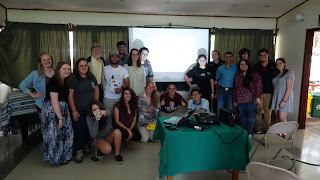By Corrin Mccullough and Hannah Garcia
Our first presentation by Lauren
and Isabella was a general overview of the foundations of Costa Rica and how it
came to stand out among Latin American countries. They described the cultural
history of Costa Rica pre- and post-Spanish conquest and how the Costa Ricans
evolved with their changing culture. When the Spaniards began to invade and
conquer, the indigenous populations diminished from three different richly
cultured population centers with hundreds of thousands to a mere 500
individuals. As Mexico defeated Spain in other parts of the world, the
Spaniards retreated and the remaining people led to a melting pot of indigenous
Costa Ricans and Spaniards. The lack of racism that ensued is a great example
of Costa Rica’s exceptionalism. While class level mattered, blood did not in
daily life; individuals were not locked into a social hierarchy based on their
race, although religion played a larger part in social conflict. Spanish Catholicism
was originally resisted by indigenous people, but it became a uniting point
despite economic and social class in the country.
This topic evoked questions about
changes in religion, the social structures of the indigenous populations, how
there may be parallels between race and economic status both in Costa Rica and
others countries such as the US, as well as what actually it means to be truly exceptional.



No comments:
Post a Comment